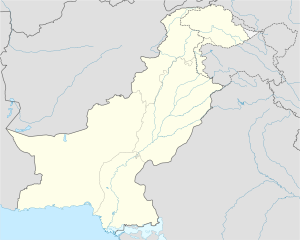Mankera
|
Mankera منکیرہ |
|
|---|---|
| City | |

A mosque in Mankera
|
|
| Location in Pakistan | |
| Coordinates: 31°23′N 71°26′E / 31.383°N 71.433°ECoordinates: 31°23′N 71°26′E / 31.383°N 71.433°E | |
| Country |
|
| Province | Punjab |
| District | Bhakkar District |
| Time zone | PST (UTC+5) |
| • Summer (DST) | +6 (UTC) |
| Area code(s) | +92453 |
| Website | mankera.wapka.mobi |
Mankera (Urdu: منكيره), is the principal town of Mankera Tehsil, an administrative subdivision of Bhakkar District, in the Punjab province of Pakistan. It is situated about 320 kilometres west of the city of Lahore.
Bhakkar is located in the west of Punjab. The mighty Indus River flows on the Western side of the District which plays havoc during monsoon season and the Jehlum and Chenab rivers both flow on the eastern side they also sometimes plays havoc during monsoon season. One third of the land is sandy of which small portion is irrigated by Thal canal. Rest of the sandy land is cultivated and is entirely dependent upon rains. People mostly depend on agriculture which is highly dependent on rain falls. As such people are poor, backward and traditional. Education and health facilities are not adequately available.
The origins of Mankera according to tradition go back one thousand years BC, it is believed that Mankera was originally Malkherkot, founded by a Rajput called Mal Khera. Mekan family have deep roots in Mankera. Mekan Raja ruled Mankera for 500 year. There is evidence that suggests that a state by this name existed during Alexander's invasion of the sub-continent. The Arabs however called it Manker Kot, and during Muhammad bin Qasim's rule in greater Sindh, the conquest of Mankera by one of his generals, Abul Asswad bin Zahar is recorded. The first Muslim governor of Mankera was Ahmed bin Khuzema who died in Mankera and is buried in Mankera fort.
Following the downfall of Arab rule in Sindh, the Hindu king of Kanauj took possession of Mankera followed by the Mekan. The Abdali kings annexed Mankera and the adjoining areas and the Baloch gave way to Saddo Zai Pathans. The Pathan rule of the state ended with the famous siege of Mankera by Ranjit Singh which resulted in the forfeiture of Nawab Surbuland's claim to Mankera and his retreat to Dera Ismail Khan.
...
Wikipedia

